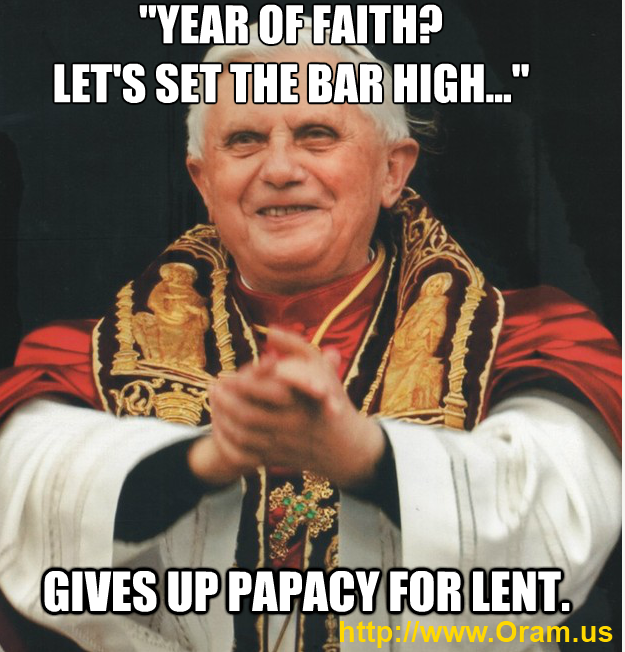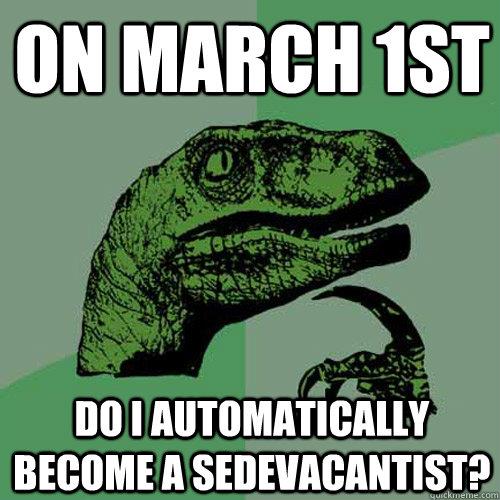A Collection of Thoughts
Pope Benedict has shocked the world by announcing that he’ll be abdicating his position as the successor of Peter, the Bishop of Rome and the head of the Catholic Church.
Dear Brothers,
I have convoked you to this Consistory, not only for the three canonisations, but also to communicate to you a decision of great importance for the life of the Church. After having repeatedly examined my conscience before God, I have come to the certainty that my strengths, due to an advanced age, are no longer suited to an adequate exercise of the Petrine ministry. I am well aware that this ministry, due to its essential spiritual nature, must be carried out not only with words and deeds, but no less with prayer and suffering. However, in today’s world, subject to so many rapid changes and shaken by questions of deep relevance for the life of faith, in order to govern the bark of Saint Peter and proclaim the Gospel, both strength of mind and body are necessary, strength which in the last few months, has deteriorated in me to the extent that I have had to recognise my incapacity to adequately fulfill the ministry entrusted to me. For this reason, and well aware of the seriousness of this act, with full freedom I declare that I renounce the ministry of Bishop of Rome, Successor of Saint Peter, entrusted to me by the Cardinals on 19 April 2005, in such a way, that as from 28 February 2013, at 20:00 hours, the See of Rome, the See of Saint Peter, will be vacant and a Conclave to elect the new Supreme Pontiff will have to be convoked by those whose competence it is.
Dear Brothers, I thank you most sincerely for all the love and work with which you have supported me in my ministry and I ask pardon for all my defects. And now, let us entrust the Holy Church to the care of Our Supreme Pastor, Our Lord Jesus Christ, and implore his holy Mother Mary, so that she may assist the Cardinal Fathers with her maternal solicitude, in electing a new Supreme Pontiff. With regard to myself, I wish to also devotedly serve the Holy Church of God in the future through a life dedicated to prayer.
From the Vatican, 10 February 2013
BENEDICTUS PP XVI
This is not unprecedented in church history, but it’s been a while.
He was appreciated by evangelicals, much like JPII before him. George Weigel also shared his thoughts.
It’s a surprise, obviously. This hasn’t happened since 1296, which is 717 years ago . . . The pope then was Pope Celestine V. He was 85 years old, too, so there’s an interesting historical symmetry here.
Scott Hahn shared the following further insights into the signs that this was coming:
Back on April 29, 2009, Pope Benedict XVI did something rather striking, but which went largely unnoticed.
He stopped off in Aquila, Italy, and visited the tomb of an obscure medieval Pope named St. Celestine V (1215-1296). After a brief prayer, he left his pallium, the symbol of his own episcopal authority as Bishop of Rome, on top of Celestine’s tomb!
Fifteen months later, on July 4, 2010, Benedict went out of his way again, this time to visit and pray in the cathedral of Sulmona, near Rome, before the relics of this same saint, Celestine V.
Few people, however, noticed at the time.
Only now, we may be gaining a better understanding of what it meant. These actions were probably more than pious acts. More likely, they were profound and symbolic gestures of a very personal nature, which conveyed a message that a Pope can hardly deliver any other way.
In the year 1294, this man (Fr. Pietro Angelerio), known by all as a devout and holy priest, was elected Pope, somewhat against his will, shortly before his 80th birthday (Ratzinger was 78 when he was elected Pope in 2005). Just five months later, after issuing a formal decree allowing popes to resign (or abdicate, like other rulers), Pope Celestine V exercised that right. And now Pope Benedict XVI has chosen to follow in the footsteps of this venerable model.
Meanwhile, Catholic Answer’s Jimmy Akin had these thoughts which I thought apropos (Note #4, which seems to disagree with George Weigel and Scott Hahn above as to when the last pope abdicated):
1. I’m disappointed. I think Pope Benedict is an amazing teacher, and I have truly valued his time as pope.
2. I have to accept his judgment. He knows his personal situation and the demands of his office better than I do. If he thinks it’s time to go, I have to respect that.
3. It’s not entirely a surprise. He himself has said things before that indicated this could someday be a live possibility for him.
4. It’s not without precedent. A number of popes have resigned before, most recently in 1415, when Gregory XII resigned.
5. It’s good that this happened “out of the blue,” rather than when there were calls for a papal resignation. The latter could encourage divisiveness (that is, if dissidents got the idea that all they had to do to oust a pope they don’t like is make a big enough stink).
We know that John Paul II thought about resigning repeatedly but didn’t, likely in significant part because there were calls for his resignation and it would have set a terrible precedent.
6. While there were no resignations for almost 600 years, just as there were no non-Italian popes for 450 years, we’re probably going to see more of both in the future.
While the next pope might be an Italian, the diversification of the college of cardinals has already resulted in a trend toward non-Italian cardinals. That will continue.
More to the present subject, the on-the-job demands for a pope have gone up in recent years. Being the leader and public face of the billion-member Catholic Church in a time of rapid change and diminishing faith is not an easy task.
At the same time, advancing medical technology means increasingly long lifespans with a longer period of frail health.
It is not easy to be eighty five (Pope Benedict’s age) or ninety or ninety five and feel confident steering the ship of Peter in today’s world.
Unless we get really wizard regenerative medical technology really soon, we’re likely to have more popes in that kind of situation, and thus there are likely to be more resignations in the future.
7. Pope Benedict may follow the pattern of previously resigned popes and spend the rest of his days in a monastery. Alternately, he may live quietly with his brother. Either way, he will do his best to stay out of the public eye so as to give his successor the freest hand possible. (This is the same thing that usually happens when a U.S. president leaves office; it’s traditional for him to more-or-less vanish, at least for a time.)
8. The fact that Pope Benedict chose to do this now, just before Lent begins, so that his resignation takes place in two weeks and we should have a new pope before Easter, means that his deterioration of health is serious. This is also the case in view of the big agenda he set for this year (the Year of Faith) and that he will now not complete.
9. I hope he does release his new encyclical–on faith–before his resignation is effective. His successor could release it anyway, with any suitable modifications he deemed appropriate. Or it could not come out at all. But I hope it will, and under Pope Benedict’s name, while he’s still pope.
10. Let us all fervently pray for both Pope Benedict, for his successor, and for the Church.

